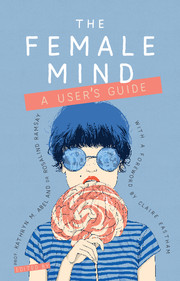Book contents
- Frontmatter
- Acknowledgements
- Contents
- Foreword
- Introduction: being female
- Part I Women in perspective
- Part II Women and society
- Part III Women and their environment
- Part IV Women and specific disorders
- 18 Depression and other mood disorders
- 19 Anxiety disorders
- 20 Trauma and post-traumatic stress disorder
- 21 The dangers of rumination
- 22 Obsessive–compulsive disorder
- 23 Eating disorders and body dysmorphic disorder
- 24 Psychosexual disorders
- 25 Personality disorders: risks and recovery
- 26 Self-harm
- 27 Women and addiction
- 28 Autism spectrum disorder
- 29 Attention-deficit hyperactivity disorder
- 30 Psychotic illness
- 31 Postnatal depression and postpartum psychosis
- 32 Living longer: normal age-related changes, dementia and depression
- Part V Women and treatment
- Contributors
- Index
25 - Personality disorders: risks and recovery
from Part IV - Women and specific disorders
Published online by Cambridge University Press: 02 January 2018
- Frontmatter
- Acknowledgements
- Contents
- Foreword
- Introduction: being female
- Part I Women in perspective
- Part II Women and society
- Part III Women and their environment
- Part IV Women and specific disorders
- 18 Depression and other mood disorders
- 19 Anxiety disorders
- 20 Trauma and post-traumatic stress disorder
- 21 The dangers of rumination
- 22 Obsessive–compulsive disorder
- 23 Eating disorders and body dysmorphic disorder
- 24 Psychosexual disorders
- 25 Personality disorders: risks and recovery
- 26 Self-harm
- 27 Women and addiction
- 28 Autism spectrum disorder
- 29 Attention-deficit hyperactivity disorder
- 30 Psychotic illness
- 31 Postnatal depression and postpartum psychosis
- 32 Living longer: normal age-related changes, dementia and depression
- Part V Women and treatment
- Contributors
- Index
Summary
Coralina's story
Coralina is a 27-year-old woman who went to her local mental health service after self-harming (cutting and overdosing). She said she heard a voice telling her to harm herself and others. She contacted Social Services because she was concerned that she might harm her 4-year-old daughter, but was very distressed when Social Services took her daughter into foster care.
Although Coralina had a long history of contact with mental health services, she had never been an in-patient, and she had always tried her best with the therapies and medications offered to her. She has looked up her symptoms on the internet and thinks she has borderline personality disorder; she wants help urgently and Social Services want an opinion about any risk to the child.
The psychiatrist asked detailed questions about Coralina's experience of herself, her life and her relationships with others. She asked about Coralina's experience of being cared for as a child, especially her experience of being looked after when ill, hurt or distressed. The psychiatrist assessed both Coralina's social functioning generally and her capacity to make and maintain relationships with partners, parents and siblings.
By doing this, the psychiatrist was looking at Coralina's strengths as well as vulnerabilities, trying to make an assessment of how severe the problems are, and the extent to which Coralina uses unhelpful, destructive coping strategies. She agreed with Coralina that the most likely diagnosis was a mild–moderate degree of borderline personality disorder. The good news was there are now a variety of evidence-based therapies that will help; the bad news was that Coralina's local NHS trust did not provide all of them and there was a long waiting list.
The psychiatrist agreed to support Coralina with regular psychiatric management while she waited for therapy. She also liaised with Social Services so that the work with Social Services and the psychiatric work with Coralina went hand in hand.
The initial period was stormy, but gradually Coralina began to trust her psychiatrist. She agreed to share care with the local authority. Her daughter was placed with family members who made it possible for Coralina to see her regularly and therefore maintain a good relationship with her. Eventually, Coralina got access to a specialist therapy group for mothers with borderline personality disorder, where she is making good progress.
- Type
- Chapter
- Information
- The Female MindUser's Guide, pp. 161 - 166Publisher: Royal College of PsychiatristsPrint publication year: 2017



